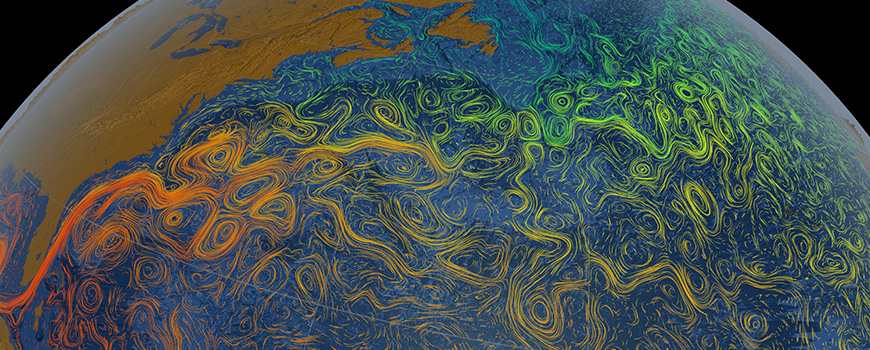Global S&T Development Trend Analysis Platform of Resources and Environment
| Research Highlight: Climate Model Predicts Faster Warming for the North Atlantic Ocean | |
| admin | |
| 2018-08-14 | |
| 发布年 | 2018 |
| 语种 | 英语 |
| 国家 | 美国 |
| 领域 | 资源环境 |
| 正文(英文) |  The Gulf Stream, part of the larger Atlantic Meridional Overturning Circulation system. Photo: NASA Researchers at Scripps Institution of Oceanography at UC San Diego have predicted faster rates of warming than previously predicted for the North Atlantic Ocean in a recent paper published in the Journal of Climate. This warming could disrupt major oceanic cycles and have worldwide impacts on climate systems. The researchers modeled scenarios based on possible future greenhouse gas and aerosol emission rates. One likely scenario focuses on future decline in aerosols and continued increase of greenhouse gases in the atmosphere. Aerosols are minute particles suspended in the atmosphere. Some scatter sunlight, thereby actually acting as cooling agents. The aerosol cooling effect is about 50 percent of the warming effect of anthropogenic carbon dioxide at present. Aerosols released from human activities are pollutants, however, and their health concerns have triggered worldwide efforts to curb emissions. An aerosol decline could spark an interesting catch-22: Because of their cooling effect, this decline would accelerate ocean warming that is already being caused by increasing carbon dioxide emissions–most notably initiating major warming in the North Atlantic. Historically, the Southern Ocean has been the predominant heat absorber, accounting for roughly 72 percent of uptake of anthropogenic greenhouse heat in the oceans, due in part to the area’s low levels of cooling aerosols. The opposite is true of the North Atlantic: under strong aerosol cooling, the North Atlantic has not taken up much heat, meaning that most of the warming in the Northern Hemisphere is happening in the atmosphere and not in the ocean. “The ocean heat uptake moderates atmospheric warming by storing much of the greenhouse heat below the surface,” said Shang-Ping Xie, a climate researcher at Scripps and co-author of the study. “We now show that the ocean uptake is not only uneven, but its distribution also evolves with time." The model presented by the researchers predicts a massive switch. With a decrease in cooling aerosols, which are concentrated in the Northern Hemisphere, over time the ocean would need to absorb more heat. The researchers predict that the North Atlantic’s share of the uptake could increase from 6 percent to about 27 percent. “It’s important to note that the Southern Ocean has been heating over the past few decades, and this will continue,” said Lynne Talley, a professor at Scripps and co-author of the study. “What’s changing is that the North Atlantic is starting to join in as a second major heat sink, which will affect circulation and climate around the North Atlantic.” Increased rates of warming in the North Atlantic could impact a key oceanic cycle, the Atlantic Meridional Overturning Circulation, or AMOC. An important part of the Earth’s climate system, the AMOC is a large system of ocean currents – such as the Gulf Stream – that pulls warmer water from the tropics toward the North Atlantic where it cools, sinks into the deep ocean, and flows southward again. Eventually the water is pulled back to the surface, where it warms and completes the circulation. Because it distributes heat and energy, the AMOC plays a major role in sustaining worldwide climate patterns, and is especially important in regulating climate in northern Europe and coastal North America. A warmer North Atlantic could significantly weaken the AMOC. The system is driven by changes in salinity and temperature; as the warm water moves north, it evaporates to become saltier and gets cooler in the northern latitudes, making it denser so it sinks. Changes in water temperature in the North Atlantic could throw a wrench into this whole process. In fact, recent studies have shown that the AMOC may have started weakening over the past decade. Greater weakening could have widespread impacts on climate and weather patterns. While all of the exact consequences are still unknown, for instance, warmer water on the surface could fuel stronger hurricanes. “The changing pattern of ocean heat uptake will cause the atmospheric circulation to reorganize, bringing changes in rainfall and storms,” Xie said. This study was funded by the National Science Foundation. -Chase Martin This story appears in explorations now, Scripps Institution of Oceanography's award-winning ocean and earth science magazine. Sign up to receive our free monthly story roundup.
|
| URL | 查看原文 |
| 来源平台 | Scripps Institution of Oceanography |
| 文献类型 | 新闻 |
| 条目标识符 | http://119.78.100.173/C666/handle/2XK7JSWQ/107702 |
| 专题 | 资源环境科学 |
| 推荐引用方式 GB/T 7714 | admin. Research Highlight: Climate Model Predicts Faster Warming for the North Atlantic Ocean. 2018. |
| 条目包含的文件 | 条目无相关文件。 | |||||
| 个性服务 |
| 推荐该条目 |
| 保存到收藏夹 |
| 查看访问统计 |
| 导出为Endnote文件 |
| 谷歌学术 |
| 谷歌学术中相似的文章 |
| [admin]的文章 |
| 百度学术 |
| 百度学术中相似的文章 |
| [admin]的文章 |
| 必应学术 |
| 必应学术中相似的文章 |
| [admin]的文章 |
| 相关权益政策 |
| 暂无数据 |
| 收藏/分享 |
除非特别说明,本系统中所有内容都受版权保护,并保留所有权利。
修改评论